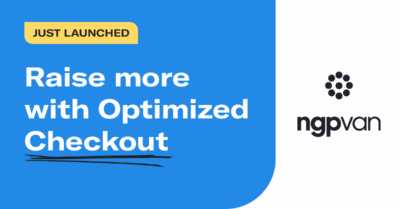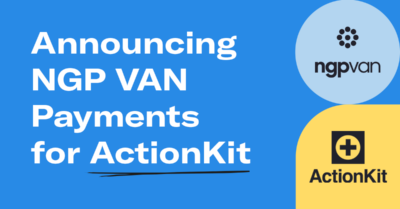Political Campaign Management Basics: What It Takes to Win

Each year across the country, passionate citizens decide to run for local, state, and national office to try to make a difference in their communities — but they often don’t do it alone. Many campaigns have a team of volunteers or paid staff that help with their campaigns. Some also have dedicated campaign managers to lead their teams and oversee campaign operations to help the campaign win.
Managing a political campaign isn’t an easy job, but it’s vital to the success of any candidacy. Learn the basics of political campaign management in this guide, including what it is, who’s involved, and how to get started.
What is Political Campaign Management?
Political campaign management involves planning, leading, and overseeing a political campaign throughout the election cycle. The task is usually handled by a campaign manager who works closely with the candidate, staff, and volunteers to create a campaign plan and execute it efficiently and effectively.
What is a Political Campaign Manager?
A political campaign manager oversees all parts of a political campaign and reports directly to the candidate. Most of the time, all other campaign staff report to this person, so they must manage staff members as well as campaign logistics. Depending on the size and scale of the campaign, a campaign manager may work full-time, part-time, or on a volunteer basis.
While a political campaign manager’s day-to-day work can vary widely depending on who else is on their team, their key responsibilities typically include:
- Solidifying the campaign’s messaging, outreach strategy, and policy positions
- Hiring, training, and managing campaign staff
- Crafting and maintaining the campaign’s budget
- Overseeing the campaign’s voter outreach, fundraising, and other activities
- Ensuring the campaign follows all relevant local, state, or federal campaign finance laws
Ultimately, campaign managers are responsible for making sure all campaign activities run smoothly and efficiently to give their candidates the best chance of winning.
What Skills Do Political Campaign Managers Need to Succeed?
Since managing a political campaign is a demanding and highly important job, political campaign managers need to be well-versed in or willing to learn about campaign strategy and all the moving parts of a political campaign. Ideally, they should have experience working on similar campaigns as well as serving in leadership roles.
However, while there are many skilled campaign managers out there, you may also have someone else in mind. Maybe it’s a trusted friend or family member, a work colleague, or another individual who you think could make a good fit. If they know how to manage multiple moving projects in a fast-paced environment with time-sensitive deadlines, they could be a successful campaign manager.
Other skills campaign managers should possess include:
Communication
Managing a political campaign involves working with all kinds of people, from the candidate themself to volunteers, members of the press, and voters. As a result, campaign managers should have strong verbal and written communication skills that enable them to inspire staff, volunteers and voters, address the media, and effectively convey the campaign’s message across a variety of different channels.
Organization and Time Management
Campaign managers must be highly organized to ensure that the campaign runs smoothly. Along with overseeing staff members, political campaign managers often take part in organizing:
- Events
- Fundraising efforts
- Voter outreach
- And whatever else needs to be done!
Even if the campaign manager decides to delegate these tasks out to other team members (if available), they still need to manage their own time wisely. With the candidate and various staff members or volunteers demanding their attention, campaign managers must be able to prioritize tasks and understand which needs are the most urgent.
Ability to Handle Stress
Political campaigns are fast-paced, high-stress environments, especially as elections approach. When things go wrong or plans change quickly, political campaign managers should keep a level head and make informed decisions for the good of the campaign. Plus, if they assemble a comprehensive campaign plan, they can include mitigation strategies to help adapt when needed!
Other Roles Involved in Political Campaign Management
Besides the campaign manager, plenty of other people play a part in the day-to-day operations of a political campaign. Their roles may include:
- Treasurer: The campaign treasurer is responsible for reconciling campaign accounts and filing complete and accurate campaign finance reports.
- Digital director: This person designs and manages the campaign’s outreach strategy. They may handle social media, digital advertising, and email marketing personally or manage a digital team.
- Finance director: A finance director manages expenses, creates the campaign’s fundraising strategy, and tracks progress toward fundraising goals.
- Field director: A field director manages field organizers and campaign volunteers, powering grassroots support and outreach for the campaign. They recruit volunteers, plan and execute voter outreach efforts, and lead GOTV activities.
- Volunteer coordinator: This individual helps recruit, intake, and manage volunteers across the campaign. While most directors or trained staff or volunteers will be responsible for training the volunteers for their specific area of the campaign, the volunteer coordinator will help direct volunteers to the activities that will most likely fit their skill set.
- Consultants: Campaigns can hire professional political or fundraising consultants to provide guidance and ad hoc support. Consultants are often hired to fill in the gaps for campaigns that have less experienced staff or those that need additional staff capacity but may not need to hire full-time staff.
Smaller, local campaigns may only have a few staff members or volunteers who take on multiple responsibilities, while larger campaigns tend to have more people on their teams with more specialized roles. Team size along with individual staff members’ experience levels will determine how much hands-on support the campaign manager needs to provide. However, the campaign manager is ultimately responsible for all campaign operations, so it’s up to them to determine where they may need additional support to succeed.
How to Manage a Political Campaign
Managing a political campaign is a strategic endeavor, and campaign managers often vary their approaches based on experience and the campaign’s needs. No matter what approach you decide to take, following these best practices will help you set your campaign up for success.
1. Set Clear Goals
Give your team direction by setting straightforward goals early on in the campaign planning process. First, determine the number of votes you need to win the election by following these steps:
- Use past election results from your jurisdiction to estimate voter turnout. Multiply the expected percentage of voters who’ll turn up at the polls by the total number of people eligible to vote.
- Calculate the number of votes you need to get a simple majority (assuming you’re in a two-person race). Using the estimated voter turnout you calculated, multiply the number of expected votes by 50%, then add 1.
Once you know exactly how much support you need, set informed goals for the rest of your campaign’s activities. Beyond the main goal of getting your candidate elected, you’ll may want to set several smaller, timely goals to guide your campaign.
For example, you might set a goal to reach out to half of the undecided voters in your persuasion universe by a certain date or recruit a certain number of volunteers based on the size of the area you need to canvass. Outline a detailed path to reach your vote goal that includes key milestones to help you measure your progress.
You’ll also want to establish clear fundraising goals with similar milestones to help you keep track of your fundraising progress to determine if you need to scale up fundraising efforts, re-allocate time or resources, or expand or cut items in your budget.
2. Understand Your Audience
Political campaign management requires a thorough understanding of your campaign’s target voters, prospective donors, and volunteers. This goes beyond knowing who your target audience is — you also need to understand what they care about and why they may or may not support your candidate.
Start by using voter databases to find data like voting history and party registration that can help you determine who is likely to vote Democratic and which voters may be undecided. Depending on the partisan split of your district, you’ll need to decide which voters to prioritize based on your win number. For instance, if you have a district that is made up of 75% likely Democrats and 25% likely Republicans, you may just focus on mobilizing those likely Democrats to win. But, if you’re in a district that’s split 50-50, you may want to prioritize voters by creating segments for undecided and swing voters, Democratic voters who only vote sometimes, and voters you know you can count on to turn out. These divisions will help you segment outreach, customize messaging to specific audiences, and hopefully convince enough voters to support you (or not support your opponent) to win.
Then, dive deeper into their motivations, priorities, and concerns to get a better understanding of how to appeal to each group. You can gain insight into voters’ opinions by talking to those who attend campaign events, having volunteer canvassers note the concerns of voters they speak with through an issue identification question, and keeping a close eye on social media to see what issues are paramount. You may also consider conducting a poll to gain more insights from voters in your district. Ultimately, it’s up to your campaign to have a clear understanding of what issues are important to your supporters and voters and create strategies to engage and mobilize them to win your election.
3. Invest in the Right Tools
Next, gather the technological resources you’ll need to achieve your goals. Take stock of the campaign tools you already have, then fill in any gaps by investing in:
- Voter databases: Databases like VAN help your organize and utilize essential voter data like names, contact information, and voting history.
- Canvassing and phone banking tools: Canvassing apps help you map out canvassing routes and allow volunteers to easily access scripts and record voter information, while intuitive phone banking tools allow volunteers to easily make calls from your campaign office, their home, or wherever they can call from.
- A political CRM: Constituent relationship management (CRM) software houses all of your data about voters, donors, volunteers, and other supporters. Storing all of this data in one place boosts efficiency and helps you measure campaign progress toward your goals.
- Digital outreach platforms: Since so many people get their news from online sources, digital outreach tools can make a major difference in your ability to reach supporters and voters. Leverage tools to streamline email creation, social media advertising, and more.
4. Create a Campaign Calendar and a Content Calendar
Your staffers will know the dates of Election Day and your campaign launch, but without a clear campaign calendar, they may not be aware of other important campaign activities that they’re not directly involved in. Creating a detailed calendar helps keep all of your staff on track and aware of the campaign’s broader progress as you get closer to Election Day.
On your calendar, strategically plan the dates for fundraising events, volunteer training, GOTV canvassing, etc. Space out major events to get your team enough time to prepare in between, and consult your field team to determine the best timing for training sessions and GOTV efforts. Ensure that staff members keep the calendar updated as plans change so your entire team is on the same page.
Content calendars help organize, streamline, and optimize their digital communication efforts. These calendars will typically contain email send dates, when web pages go live, what social media posts will be posted when, and more. Utilizing a content calendar helps ensure a healthy content mix, consistent and timely communication, and coordination among team members to meet important deadlines. Both content and campaign calendars are important parts of your campaign plan that will serve as a guiding roadmap for your team as the election cycle progresses.
5. Develop Your Campaign Plan
Your campaign plan is the comprehensive document that explains everything you plan to do for your campaign in detail. This plan often different aspects of your campaign including, but not limited to:
- Fundraising: How much money do you plan to raise? What methods will you use to raise it? How will you measure fundraising progress and engage with donors?
- Field: How many days a week will you knock doors or call voters? How many volunteers do you need to contact enough voters to hit your win number? What canvassing software will you use to make your canvassing efforts more efficient?
- Communications: How often do you plan to post on social media? How many emails will you send per week and what will the topics be? How do you plan to get your message out to voters via paid and non-paid channels?
- Media: Will you send press releases to local media outlets? Will you purchase ad time on local advertising channels (cable, OTT, radio, etc.)? Do you have a plan to garner earned media opportunities when possible?
- Campaign and content calendars: When will you publish your campaign website? How often will you host fundraising events? When will you schedule call time?
- Opposition research: Where does your opponent stand on the issues? Did you find any information that could be detrimental for their campaign if shared? Were there any unpopular votes cast by your opponent that you could use to your advantage?
All of this information is incredibly helpful to compile in a single document or location to share with trusted advisors or staff only. Make sure to add as much detail as necessary and include key performance indicators (or KPIs) to measure your success throughout the campaign.
Improve Your Political Campaign Management with NGP VAN Software
Political campaign management is hard work. That’s why NGP VAN created innovative, industry-leading tools that help campaign managers handle some of the most important tasks they’ll need to execute regularly. From organizing to fundraising to engaging supporters, our software helps make managing your campaign easier and more efficient. Request a demo today to get started.



